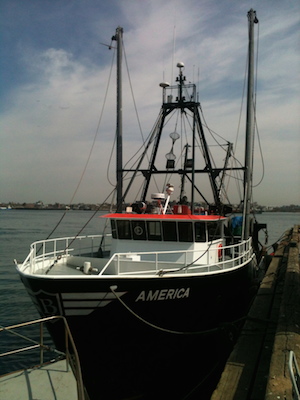This weekend the Boston Fish Pier will celebrate an impressive milestone. On July 27, the pier's centennial anniversary will be celebrated as part of the third annual Boston Seafood Festival taking place at the fish pier.
The festival will feature family-friendly activities and entertainment, as well as plenty of seafood offerings, including a lobster bake that the Boston Fisheries Foundation, which created the festival, is hosting. But the non-profit organization also weaves an education component into the festival offerings that teaches visitors about the region's historic fishing industry.
Certainly, the fish pier has played a big role in the industry's history. Located on Northern Avenue, the Boston Fish Pier, which opened in 1914, is the nation's oldest continuously working fish pier. And according to Robert Nagle, vice president of the foundation's board of directors, the fish pier had no equals when it opened.
"When it was built in 1914, it was the most modern fish processing pier in the world," Nagle says. It was fully automated for ice deliveries, had its own power plants, and had the capacity to hold an estimated 30 million to 50 million pounds of frozen fish, he says.
The dragger America sits dockside at the Boston Fish Pier, which celebrates its 100th anniversary this year. Linc Bedrosian photoSail-powered vessels were the norm when the fish pier opened for business. At one point, the fish pier supplied over 2,000 jobs and served hundreds of boats, Nagle says. Originally, fishing industry companies and fishing families owned the pier. However, Massport, the independent public authority that owns the pier, assumed ownership in 1972. It has invested some $30 million through the years to modernize pier facilities.
This year, the seafood festival is celebrating the fish pier's history, but it's also teaching the estimated 10,000 to 15,000 visitors who attend the festival about how fishermen from Boston and other New England ports are responsible seafood harvesters who provide a delicious and nutritious product that also offers economic benefits to local communities.
The foundation, which formed in 2012, is working to educate the public about the industry. It strives to combat the often confusing amount of information that people receive about the fishing industry.
"This is a tremendously regulated industry, and people have worked hard to make sure there will be strong fisheries for the future," Nagle says. "When you buy a local seafood product, money is circulating in your region, and there's an economic efficiency to that."
The foundation also works to educate chefs about what species are available and when they're available so that they can promote them on their restaurant menus. It also hopes to develop a fisheries maritime museum devoted to telling the stories of the people who have created the industry's fishing heritage.
"There are so many hardworking fishing families," Nagle says. "There are people on boats, people on shore who work in transportation, delivering ice, fuel. There are the insurance companies the shipyards; it's been a very honorable profession. We help to feed people a great food product."







